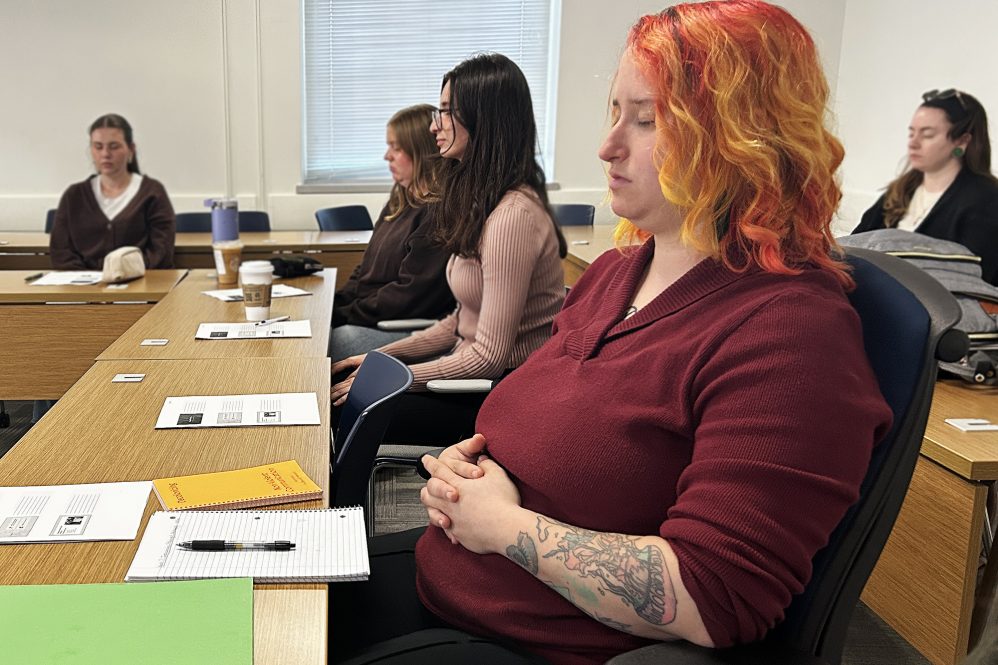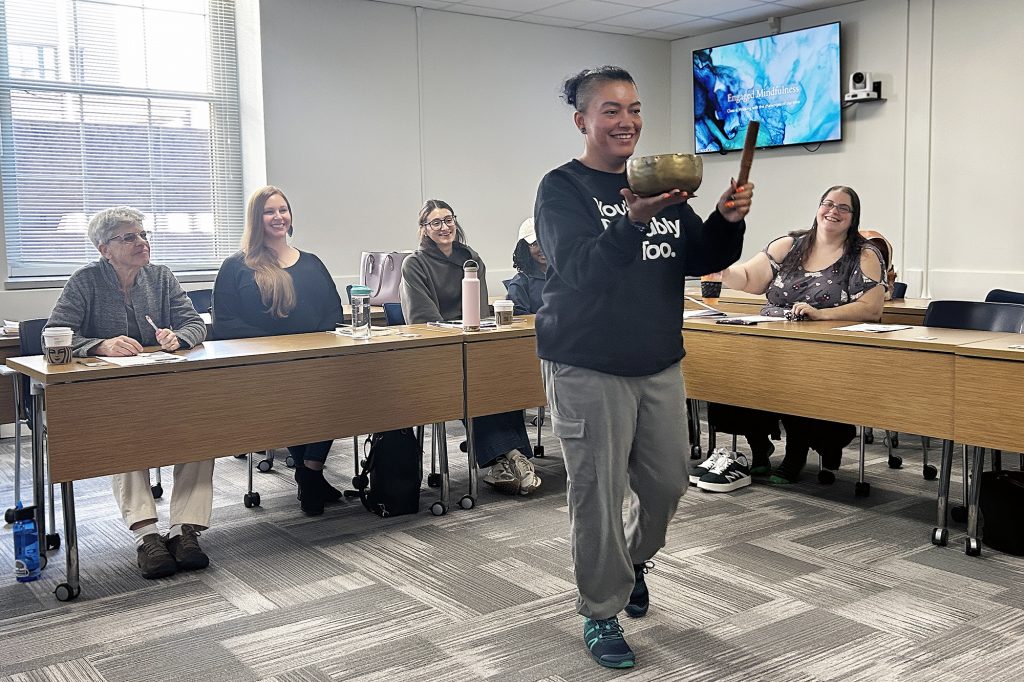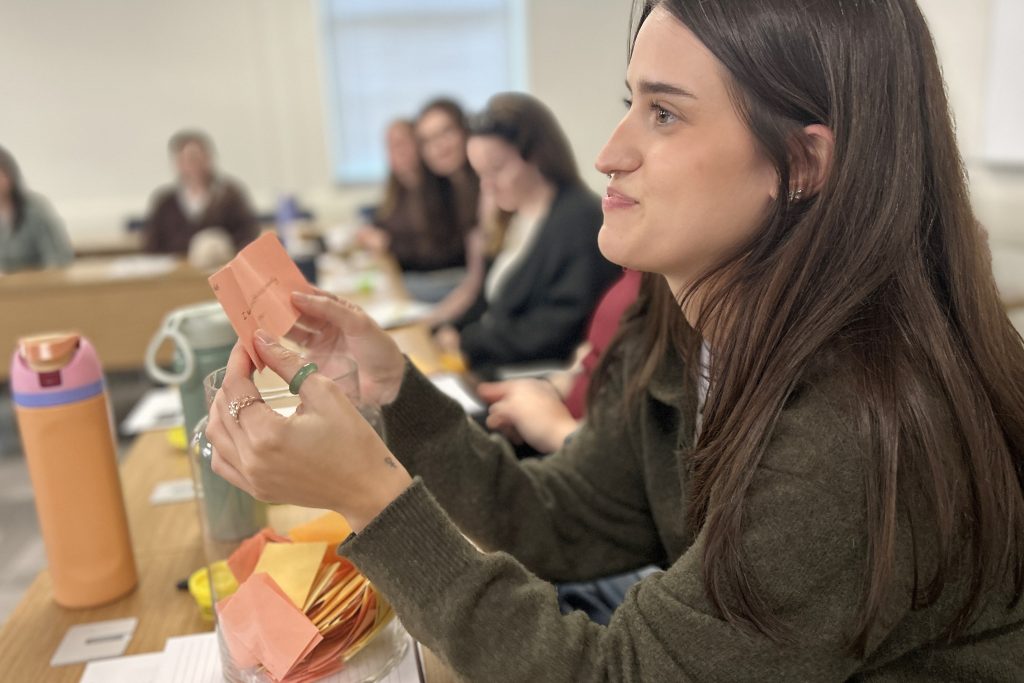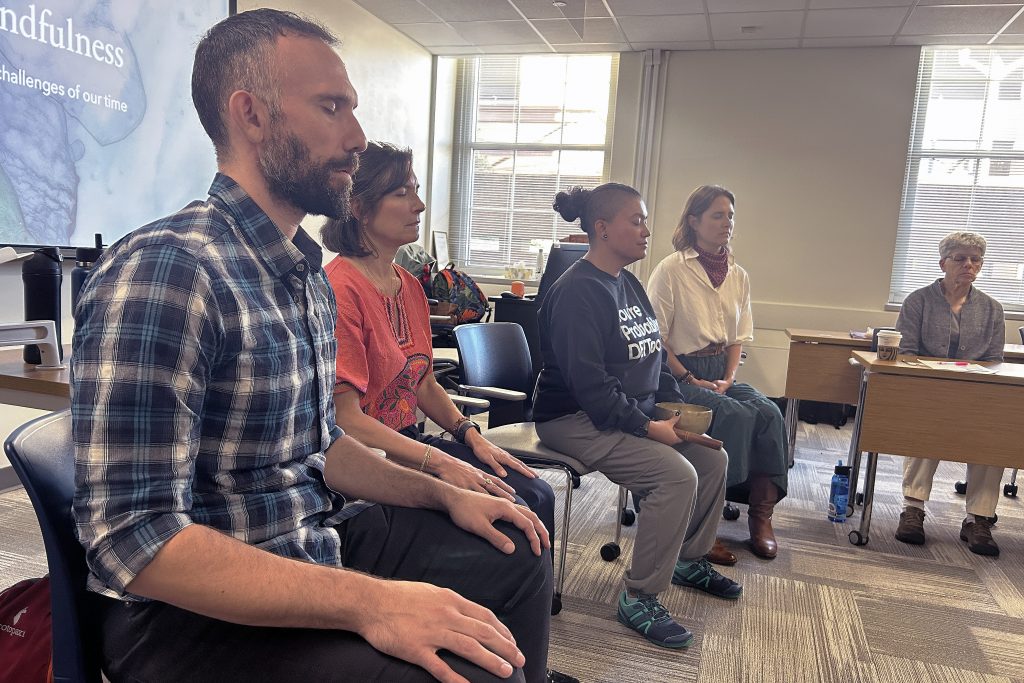"Social workers carry the world's challenges on their shoulders," says Associate Professor and course instructor Caitlin Elsaesser. "By practicing mindfulness-an energy of awareness-we nurture the presence and compassion that make transformative healing and advocacy possible."

MSW student Alana Frenkel participated in a meditation during Engaged Mindfulness, a School of Social Work course designed to help future social workers become more compassionate and aware of their emotions and environment. (Olivia Drake/UConn Photo)
"Who wants to be the bell ringer today?" asks doctoral student and guest facilitator Vivien Roman-Hampton.

Around her, 14 Master of Social Work students set aside their notebooks, pens, and Starbucks lattes. They lower their heads and close their eyes.
"Today, we're going to focus on the awareness of sound," Roman-Hampton continues softly. "Listen for what's in this space right now-the vents, the projector, my voice. Maybe other sounds from beyond these walls. Really anchor into them. Be aware that they exist-like us."
The room falls still. The steady hum of an air vent muffles voices from outside the classroom. A paper rustles. Five minutes pass.
Then, MSW student Jade Hardrick '22 (SSW) strikes a copper bowl.
Gong. And the meditation concludes.
This isn't a typical lecture at the UConn School of Social Work. It's week six of Engaged Mindfulness, an experiential course designed to help future social workers develop a deeper, more compassionate understanding of themselves, others, and their environment. These essential skills are crucial for thriving in one of the nation's most emotionally demanding professions, often shaped by trauma, burnout, and systemic stress.
"Social workers carry the world's challenges on their shoulders," says Associate Professor and course instructor Caitlin Elsaesser. "By practicing mindfulness-an energy of awareness-we nurture the presence and compassion that make transformative healing and advocacy possible."
While the students practice mindfulness during meditation, the practice isn't limited to sitting still or doing a specific exercise; you can be mindful "while playing basketball, walking, or even responding to emails," she says. "It's more about how you bring your attention to the present moment."
The "Wishes Jar"

After meditation, Elsaesser passes around an oversized glass container stuffed with folded color papers. It's known as the "wishes jar." On the first day of class, students jotted down wishes to share for themselves or their peers. MSW student Mia pulls out a folded colored paper and reads it: "My wish is for you to be happy and safe."
Mia passes the jar to classmate Julia who passes it to Jessica. "My wish is for me to get to know myself," she says.
"That's part of mindfulness - listening to yourself," Elsaesser says. "This is the same skill you, as social workers, will use to listen deeply to others."
The moment becomes a gateway to deeper connection. Students transition into what Elsaesser calls "community care time"-a mindful listening exercise where each person shares a reflection.
Today's prompt: What is something you could use community support with, but have been afraid to ask for?
Participation is optional, but MSW student Alana Frenkel speaks up. She admits she struggles to ask for help. Around her, several classmates nod in agreement.
Now in her final year of the MSW program, Alana Frenkel says she "felt intrinsically compelled" to enroll. As a crisis response clinician intern, she uses mindfulness every day.
"I appreciate how we're able to blend concepts we've learned in other MSW classes-like oppression, suffering, and activism-but hold them in a different light," Frenkle says. "Mindfulness practices will help me be a better social worker. It's helping me regulate my own emotions, slow down my reactions to real-world experiences."
A Personal Journey of Healing
When MSW student Diana Mendoza registered for the Fall 2024 Engaged Mindfulness class, she didn't know what to expect.
"I enrolled with no expectations," she recalls. "What I didn't know was that this class would take me on a deeply personal journey. It became so much more than a course-it was a life-changing experience."
One session focused on the theme of suffering. During a body scan meditation, Elsaesser asked students to locate where they physically felt emotional pain.
"All of a sudden, I started to cry," Mendoza says. "I kept thinking, please stop crying, everyone is looking at you, but the tears wouldn't stop. And then I reminded myself-it's okay to feel what I'm feeling. In the past, I would've judged myself, but I've learned to give myself grace and permission to feel everything."
That moment, she says, marked the start of a healing process.
"I've learned more about myself in one semester than I have in 32 years," Mendoza reflects. "Now, when someone's angry or frustrated, I try to respond with awareness instead of reacting. I've learned their anger isn't about me-they're just going through something themselves."
Learning to Respond, Not React
Mendoza's classmate Camille Fortin, a 2025 MSW graduate and LMSW says the class changed the way she manages emotional intensity in her work and uses mindfulness techniques to navigate high-stress environments.
"One of the most valuable lessons I learned in the class was non-violent communication," Fortin says. "I learned how to gain space from emotions so that you can feel anger without becoming anger. This practice created a pause-a chance to respond rather than react."
She adds, "It's helped me engage more compassionately with myself and others. I've learned that behind every behavior is a need, and that empathy can be more effective than judgment in fostering understanding."
These insights, Fortin says, are transforming her practice as a social worker and therapist. She's currently completing a fellowship at the Yale Child Study Center, offering Intensive In-Home Child and Adolescent Psychiatric Services (IICAPS). "By grounding myself in observation and empathy rather than assumption, I'm better able to hold space for others without becoming overwhelmed or reactive."
From Research to Real-World Practice

Before developing the course, Elsaesser, Roman-Hampton, Assistant Professor GioIacono, and Professor Lisa Werkmeister Rozas, director of the Puerto Rican and Latino Studies Project, co-designed a research project titled Creating a Socially Engaged Mindfulness-Based Intervention.
Supported by grants from the Trust for the Meditation Process and UConn's Institute for Collaboration on Health, Intervention, and Policy (InCHIP), the project created an eight-week intervention blending traditional mindfulness, compassionate listening, and critical reflection on oppression and social change-helping participants connect inner practice with outer action.
The results were striking. Students reported measurable increases in mindfulness, compassion, and sense of belonging-mirroring what researchers were seeing firsthand.
"The feedback was powerful," Elsaesser says. "Students told us, 'This is the first place I've felt I could really be myself.' That sense of authenticity and belonging became the seed for the full course."
A Mindful School in the Making
Today, Engaged Mindfulness anchors a larger vision: developing a "mindful school"-a community where compassion and presence are integrated into every aspect of learning, teaching, and practice.
In addition to the course, Elsaesser and her colleagues host the School of Social Work Mindful Practice Group, which meets weekly and is open to all students, faculty, and staff.
For Elsaesser, mindfulness is not a retreat from the world but a way to engage with it more intentionally.
"Being mindful isn't just about managing stress," she says. "It's about awareness-of ourselves, our bodies, and our connection to others. It's deeply countercultural in a society that teaches independence and productivity above all else."
She pauses, then adds:
"Our hope is that by cultivating presence, our students will go into the world not just to serve others-but to be with them, fully and compassionately. That's where social work begins."






